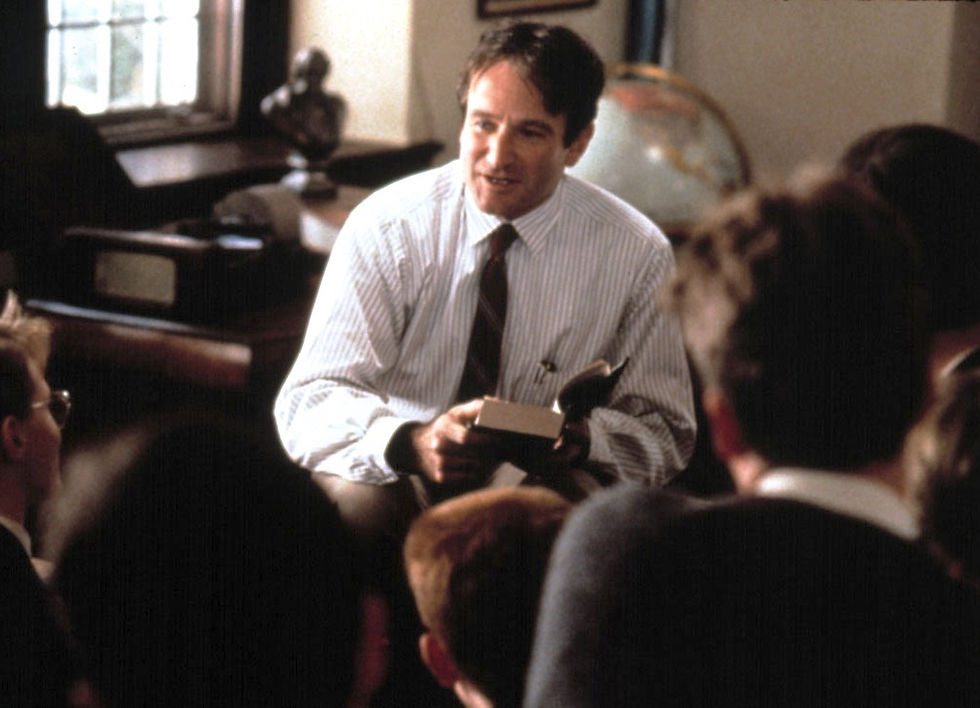Dead Poets Society is simple enough
- Charlie Fountaine

- Sep 5, 2016
- 3 min read

I’ve always been drawn to stories with moral ambiguity — protagonists living on the tenuous edge of reason, not knowing whether they will find redemption, or if we even want them to. But there’s a more popular side of Hollywood that abides by moral directness: right vs. wrong, good vs. evil. Surprisingly, this type of story might be more difficult to tell; it requires finding stimulation in simplicity.
Enter Dead Poets Society, which takes no shame in painting its characters with strokes broader than an interstate highway. The lead is Neil, a teenager and aspiring actor whose father is so harsh and controlling he leaps off the screen. On the other side is Robin Williams’s John Keating, a passionate English teacher espousing individualism and non-conformity. Moral lines have been drawn. In the middle: impressionable young boarding school students, forced navigate these disparate philosophies. Which direction will they go?
There’s no question which direction the movie wants them to go — Keating immediately captures our hearts when he tells his class to rip pages out of the textbook because they’re “excrement.” His prevailing lesson is “Carpe Diem” — seize the day — encouraging his students to live life to the fullest under the daunting but liberating understanding of their pending deaths. There’s nary a scene which begins to question Keating's wisdom, and the one irony may be that in celebrating his free-thinking message, the movie leaves zero room for interpretation. When Neil lands the lead in the school play, his father is so intolerant as to be contemptible, and if he's softened for a brief moment when he appears in the play's audience (ostensibly to support his son) it’s quickly forgotten when he drags Neil out of the theater by the ear. We get it: arts, creativity, individual-thinking good; conformity, convention, discipline bad. It’s a valuable post-war lesson, albeit one Keating would presumably be more willing to let us arrive at on our own.
But then screenwriter Tom Schulman (who won an Oscar for this) and director Peter Weir remind us what the stakes are. Forbidden to follow his passion, banished to a decade of medical school and lifetime under a merciless father, how does Neil respond? He runs off and joins the circus, right? Bum a trip to New York City trying to make it as an actor? No — he kills himself. Carpe Diem. (This is a movie with the word "dead" in the title, after all.) With the rest of the school left to react, the ending is an inspiring scene that’s since been ripped off in movies like Finding Forrester (another prep school drama): students standing on their desks in support of the ousted Keating, asserting vibrant independence over the futile cries of an aging and irrelevant administrator.
Side note: there’s interesting subtext in the timing of the story, set on the cusp of the 1960s in 1959. While Keating’s students begin the film under the disciplined boot of war time sensitivities, by the end they no longer fear standing up to the stodgy administration, embracing the rebelliousness that will define the following decade. In this historical context the story takes on broader meaning, an early sign of —maybe even catalyst for — the inevitable cultural upheaval to come, when the Dead Poets Society will graduate from students into men. Perhaps it’s not unfair to credit John Keating with jumpstarting the 1960s.
Comments